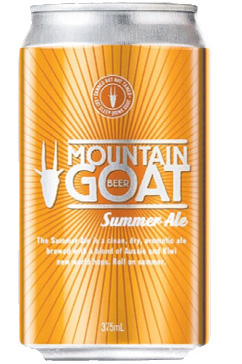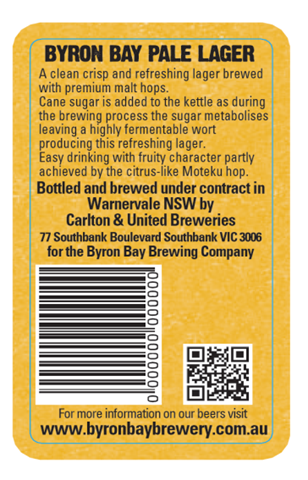
ACCC decision has wider implications for the brewing industry
This week’s announcement by the ACCC that it has has accepted a court enforceable undertaking from Carlton & United Breweries (CUB) over the manner in which it advertised Byron Bay Pale Lager seems set to have wider implications for the brewing industry.
As part of the announcement, ACCC Chairman Rod Sims said, “The ACCC will be writing to other participants putting them on notice of this matter in order to ensure that marketing and labelling in the beer market appropriately reflects where and by whom beer is brewed.” [emphasis added
[pullquote]It is not enough for small brewers to complain about the actions of the larger brewers when their own labelling is not clear.[/pullquote]There are already discussions in the industry that this will see a greater focus by the ACCC on labelling and beer provenance that will force brewers to be more transparent about ownership and even brewing location. This is a move that could affect brewers with multiple brand ownerships and brewers with contracting arrangements.
In a statement provided to Australian Brews News, the ACCC advised:
The ACCC’s 2014 Compliance and Enforcement Policy identifies credence claims, particularly those with the potential to adversely impact the competitive progress and small businesses, as a priority area.
Credence claims are claims that give the impression that a product, or one of its attributes, has some kind of added benefit to consumers when compared to similar products and services. These claims go beyond generic descriptions of products.
These claims can suggest that a product has certain qualities derived from, for example, its country or place of origin or its environmental or organic credentials. This year, the ACCC is focussing on credence claims which suggest that products are manufactured by small, niche businesses when they are not.
Often the consumer cannot independently verify the claims for themselves and must trust the seller.
We will be writing to other industry participants and putting them on notice of this matter in order to ensure that marketing and labelling in the beer market appropriately reflects where and by whom beer is brewed.
While the focus of this action by the ACCC is on the beer industry, we are concerned about this type of conduct by businesses in all sectors of the Australian economy.
It will be interesting to see what the letter to brewers contains.
Labelling has been an issue that Australian Brews News has been following for some time. While the Byron Bay Pale Lager case was the clearest example of a brewery deceiving the public about the provenance of a beer, CUB is not alone in their labelling practices. As we have discussed at length with Chuck Hahn, Lion’s ownership of Kosciuszko Brewing Company is carefully hidden in the labelling, as is the fact that bottled beerhas never originated at the Jindabyne-based brewery, nor has the vast majority of the draught product.
None of this affects the quality of the liquid, and many consumers may be reassured that Kosciuszko Pale Ale is produced at Little Creatures Geelong Brewery. However, for drinkers who are making a political decisions in the beers that they purchase, either to support small breweries or independent producers, clearer labelling is critical.
But smaller brewers too need to consider their positionsas well in light of the decision.
Beer drinkers buy beer for a wide range of reasons. Flavour is just one. Craft brewers typically portray themselves as scrappy little battlers hand producing beer in a location that they are clearly identified with. But what happens when that brewery can’t meet demand from it’s existing capacity and contracts to have their beer made? Contract brewing is a vital part of the Australian beer market and enables growth in the small brewing industry. But, as the ACCC recognises in its statement, ‘credence claims’ are important and the question must be asked whether there is a percentage of consumers who – for whatever reason – might be interested that the beer they are drinking is brewed in an extremely large brewery owned by a multinational brewing concern rather than in a scrappy little brewery in suburban Melbourne, Sydney or Brisbane -even if it makes no difference to the beer itself.
One exampleis Mountain Goat. Contract brewing has seen the craft brewing pioneers significantly expand their distribution and reachand is a good news story for craft beer.
 However, when a significant percentage of their beers is produced at the Asahi-owned Independent Distillers plant in Laverton rather than at their own brewery at Richmond, does that change their narrative?
However, when a significant percentage of their beers is produced at the Asahi-owned Independent Distillers plant in Laverton rather than at their own brewery at Richmond, does that change their narrative?
Mountain Goat has always taken the attitude “we don’t hide the fact, but we don’t advertise it” when it comes to their contract brewing arrangements. To find out the source of their bottled beer, the interested drinker must search on the brewery’s website where they will learn:
17 years on and Mountain Goat remains 100% independent and is still led by its founders. There are around 25 full time staff and another 20 casuals. They brew all their kegged and specialty Rare Breed beers at their Richmond based microbrewery and the 330ml bottled and 375ml canned beer at a larger plant in Laverton, Melbourne. [italics added].
Even when they disclose their multi locationalarrangements, a fairly high level of knowledge of the beer industry – or significant further research – is required to make their disclosure meaningful.
Again, none of this affects what you objectively taste in the bottle or can, or the incredibly important role that Mountain Goat has played in the Australian craft industry. No doubt it will not change the loyal support of many of their hard-earned drinkers. But, as they have grown and expanded and changed the mechanics of their production, their brand narrative must change as well.
It’s up to the beer drinker to decide whether they regard a beer that comes from a single brewery as being the same as a beer that comes from multiple breweries, with different levels of control and degree of actual ‘hands on’ from the label’s owners.
While the common refrain is “it doesn’t matter where the beer comes from“, the obvious response is “if it doesn’t matter, why not be open about it?” As with most secrets, it’s the keeping of the secret that colours it as as being sordid.
Mountain Goat are by no means being singled out here and nor are they the the only brewery who use contracting arrangements, which is a legitimate means of expanding production. We will hopefully see many more of our current craft breweries struggle to meet the increasing demands for craft beer.
Their story is an interesting talking point to get the conversation going about provenance in the craft market. Are there differences in the brand offering of a brewery that gets its beer made in a brewery owned by a Japanese multinational and shares the tanks with Coles’ homebrand beer and breweries such as Bridge Road and Stone & Wood that keep production in house and struggle to keep up with demand but see retaining brewing control as important to their brand and their story?
Beyond that, small breweries unwilling to provide clear information on their labelling and website about their production give cover to obfuscation by the likes of Coles and CUB. I have regularly raised labelling with large brewers and whenever I raise the issue of provenance, they always make the point that ‘we’re not the only ones’ and point to examples such as this. And, at least in my view, it is a fair point.
It is not enough for small brewers to complain about the actions of the larger brewers when their own labelling is not clear.
In any event, a standard has been set by the ACCC action. After the ACCC’s announcement, I contacted CUB who, through a spokesperson, advised:
CUB treats its commitment to the law seriously and has worked with the ACCC to address their concerns. The labelling has been revised to better disclose the third party contracting relationship between the Byron Bay Brewing Company and CUB.
They further provided a copy of the new label (right).
Given the ACCCs statements, it seems as though we will end up seeing more labels just like this. Having gone from one of the most misleading, the Byron Bay label is now one of the clearest.




